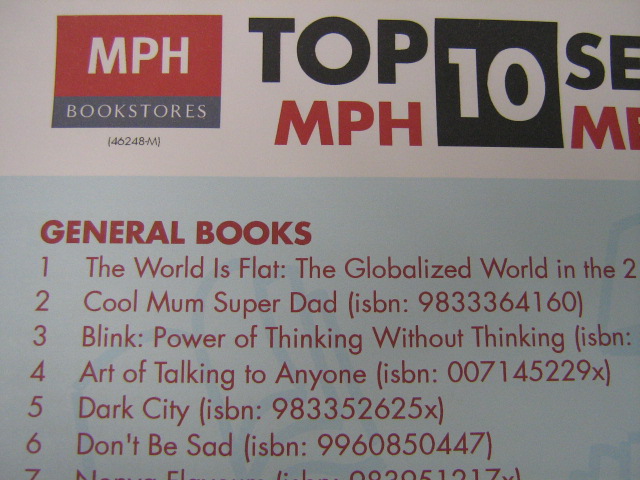Trashcan Child - Part Two
http://thestar.com.my/lifestyle/story.asp?file=/2006/12/3/lifebookshelf/16124605&sec=lifebookshelf
Do we get second chances?
In the final part of the condensation of Trashcan Child from Dark City: Psychotic and Other Twisted Malaysian Tales, author Xeus reveals the shocking twist in her tale.
ANOTHER year passed uneventfully. Patience grew up, learnt to run, stumble and fall. She learnt how to count and read, and with that came a period of books, toys and demands. Ida bought picture books for Patience by the dozen. Each night, before the toddler went to bed, Ida would read her a story.
August thirteenth dawned hopeful. Once again, Ida dressed Patience in her best clothes and waited for Pearl to come.
But once again, as the day waned into sunset, no one showed up to claim the child.
♦♦♦♦♦♦♦
The ball whizzed through the open window and struck the Ming dynasty urn full force, shattering it to pieces.
“Oh!” Patience gasped. Her hands clapped over her mouth. Mama would be so mad. She loved her vases so and Patience had always been so careful not to lay a finger on them.
Almost not daring to look, Patience tiptoed into the house, where the precious urn lay in ruins at the back of the cabinet. Was there a way to glue the pretty blue and white porcelain pieces back? Was there a way to roll time back? And what was that grey dust scattered all round the shards and on the floor? Patience knelt to finger it. The Ming urn wasn’t empty after all. It was a vessel for what felt like –
“Patience! What have you done?”
Patience jumped back guiltily, cringing. “I didn’t mean to, Mama, please, I’ll pay you back.” At the back of her eyes, she felt hot tears begin to pool.
”Go to your room, child.”
That’s it? Patience peered from between her fingers. Her mother was kneeling, sifting through the grey ashes in her hand, the expression on her face pensive.
Her face was shrouded in such sadness that it struck Patience harder than any physical blow.
“I said go.” Her mother’s voice was flat, without affect.
Patience fled to her room.
Oh, but Mama was so good to her. And she was always disappointing Mama. She could see it in Mama’s eyes, as though she couldn’t quite measure up, no matter what she did.
The bedroom door creaked open. Wiping her eyes, Patience looked up. Her mother stood at the door, face wary.
“Oh, Patience.” Mama just stood there, as if afraid to come in. “The urn doesn’t matter. Really, it doesn’t.”
“But it does! I know how much you love it.”
Patience held out her arms, willing Mama to come to her. And Mama did. They hugged, and she knew all was forgiven. But as always, she could feel Mama holding back.
“What is it, Mama?” she whispered.
“Nothing. It’s your Special Day, that’s all.”
“Is it my birthday?”
“Sort of. Only better.”
“Why do I have a Special Day and not a birthday like the other kids?”
“I don’t know,” Mama said into her hair. “But one day, you and I will find out.”
♦♦♦♦♦♦♦
She was being followed.
Behind them, furtively ducking behind street corners and into shop entrances, hiding behind throngs of pedestrians, always keeping a good distance away, Patience could glimpse the woman with the haunted eyes. The eyes mesmerized her, even from this distance, and an odd sense of déjà vu wormed through some submerged memory. Where had she seen that woman before? And why were such strong emotions associated with the memory? In all her eight years of life, she had never felt this way.
“Mama.” She tugged at her mother’s hand. “There’s a stranger following us.”
“Where?”
“There. That one.”
Mama looked long and hard at the woman, who was now unsuccessfully trying to merge with a lamppost. The woman was dressed in a baggy T-shirt and faded jeans, ripped at the knees. She had a mouth like a splash of wet paint against pale, pale skin, and she looked as though she hadn’t eaten well in years.
“Do you know her, Mama?”
“No. But she’s only a girl,” Mama murmured.
“Who is she?”
“I have no idea.”
“Why is she following us?”
“I don’t know, but we should keep walking.”
Later that night, Patience awoke to low voices from the lounge downstairs. Mama was having a rare midnight visitor. Creeping silently to the top of the landing, Patience bunched up her knees and sat on the top stair, peeking through the banisters and cocking her ears to listen.
“... couldn’t keep her,” the stranger from today stood at the door, barred from entering by Mama. “I was a mess. I had no money, no prospects.”
“That’s no excuse. What you did was very, very cruel.” Mama’s voice was severe.
“I know,” the stranger replied miserably. “That’s why I’m here now. Like you.”
“Don’t compare yourself to me. We’re not alike.”
“I didn’t mean for any of it to happen. I was just a child.”
“You should go.”
“I just wanted to see her, to see how she’d turn out.”
“Well, you saw her.”
”Can I talk to her? Just to tell her how sorry I am?”
“I think it’s best you didn’t. And now, you really should go.”
♦♦♦♦♦♦♦
“I think I should take up nursing.”
Her mother looked up from the porcelain teacup she was sipping. “But why?”
“I want to help people.”
“I’d rather you be a doctor. You can help more people that way, and make a better living out of it.”
The sixteen-year-old Patience pursed her lips. They had had this conversation many times.
“Mama, I told you. I’m not interested in being a doctor. It’s not the only noble profession out there, okay?”
“It pays better.”
“But I’m not interested in money.”
“You think you’re not now, but –”
“Mama, I mean it. I’m really not interested in money.”
Patience looked so serious that Mama ruminated over this.
“No, I suppose not,” her mother said thoughtfully.
“I suppose none of it matters in the end.”
Patience sat down on the sofa next to her mother. “It’s not that bad, Mama. I’ll be helping a lot of people. You’ll be proud of me, you’ll see.” She laid a hand on Mama’s belly, where she knew the old scar lay, bunched up like an overgrown keloid gash.
“I’ll be able to help people who have cancer, just like you once had. You were lucky to be cured of it. But there are plenty of cancer victims out there with no one to support them, and I believe that’s where I can make a difference.”
♦♦♦♦♦♦♦
As the years tumbled into one another, Ida watched from the sidelines as Patience graduated from nursing school, scored As in her class, landed a posting in the General Hospital’s oncology ward, and become – in her superior’s words – the nurse “most likely to make a difference in people’s lives”.
Now Ida understood why it could be such a joy to have children, to watch them grow from rough-edged saplings to worthwhile people on their own. But I wouldn’t have just any child. It could only have been Patience. And indeed, Patience was the sweetest, most tractable daughter anyone could wish for. Ida had brought her up well. When asked the secret of her success, Ida would say, “It was easy. I didn’t impose my will on her. I simply let her be.”
The vague fondness she had felt for Patience in her formative years had now deepened into an unshakeable bond between mother and child. Why, Ida realised, tears in her eyes, this is love. I love that trashcan child more than her own poor junkie mother could ever claim to.
One day, Patience came home, breathlessly flushed with excitement. “Oh, Mama, he’s asked me to marry him!”
“Who? That nice doctor you’ve been dating?”
“The one and only!” Patience flung her arms happily around Ida. “Oh, I’m so happy!”
Ida hugged her back. She would be alone again, free to carry on with her life before Patience had come into it.
Suddenly, Ida couldn’t bear the thought of going back to it.
“I’ll come home every week, I promise,” Patience assured her.
Patience kept her promise to visit every week, and she brought along her new husband to brighten up Ida’s days. And then Patience got pregnant and gave birth to a daughter of her own, whom she named after Ida. Later on, a son was added to the ensemble. Both children were spunky, opinionated and individualistic.
Instead of losing Patience, Ida had gained an entire family.
And then one day, it came time for her to die.
Ida was eighty-five years old. The baby Patience had come to her when she was fifty and was now thirty-four, a beautiful mother in her prime. “I’ve done well by her,” Ida thought as she lay in her hospital bed. “I really have. I have no regrets this time.”
Now, the sun was rising outside. The door yawned open, and Ida looked up, expecting the morning nurse.
But it was a visitor she had not seen in thirty-five years.
A little too late, Ida realised it was August thirteenth. Pearl stood beside her bed, as unchanged as the day Ida first saw her.
“You’ve come for her,” Ida stated.
“Actually, no,” Pearl said, her eyes smiling. “I’ve come for you.”
“It’s time then.”
“It’s time.”
Ida laughed softly. “I never thought I’d get a second chance.”
“All of us get second chances. Even the ones who don’t think they need one.”
“So have I – passed?”
“It’s not a test, Ida.” Pearl sat gently on the bed and took Ida’s hand. “How do you feel this time round?”
“Dying a second time is never easy. The first, so many years ago –” Ida shook her head “– the cancer ate at me. I was riddled with it. I asked to be cremated then because I wanted to burn it out.”
“But you kept the scar, to remind you.”
“I kept the scar,” Ida agreed. “Will she ... live on?”
“Until she’s ready to go, yes.”
Ida looked around her. “This place you guys have created. You can tell your boss it isn’t half-bad. Could do with better Darjeeling though.”
Pearl smiled. “Tell her yourself,” she said, closing Ida’s eyes one final time.
♦♦♦♦♦♦♦
“Oh, my goodness me. You poor baby. Who could’ve put you in a trashcan?”
Pearl lifted up the dead baby, letting the soaked blanket fall from it back onto the garbage bags.
Someone had drowned the poor little thing and cast it aside like yesterday’s trash.
“Don’t worry, little one,” she crooned as it opened its hidden eyes to smile up at her. “We’ll find you a home yet. You’ll get your second chance.”







